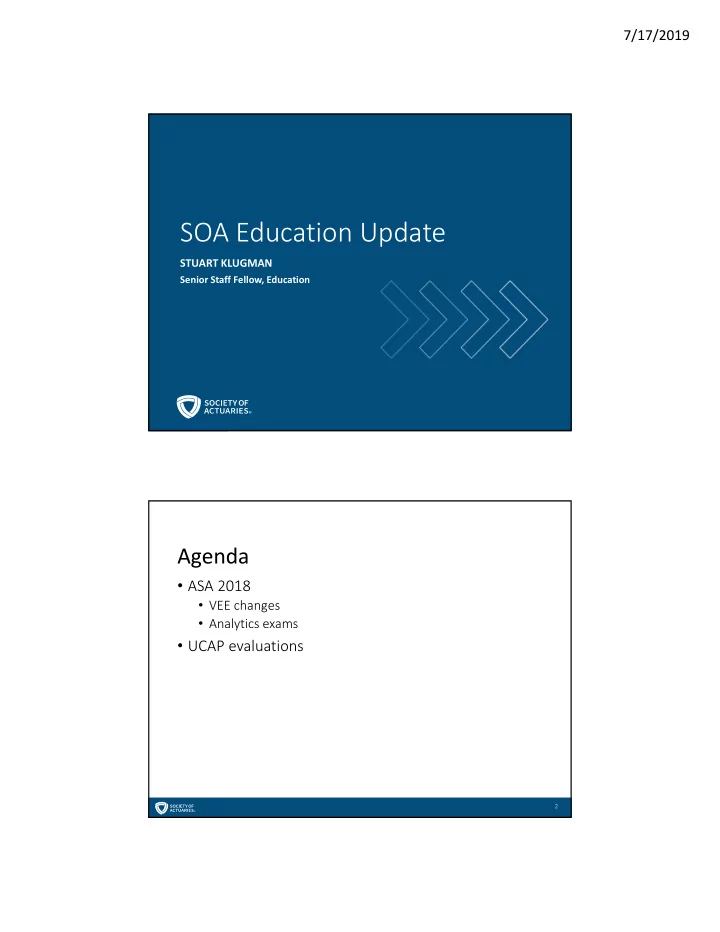

7/17/2019 SOA Education Update STUART KLUGMAN Senior Staff Fellow, Education Agenda • ASA 2018 • VEE changes • Analytics exams • UCAP evaluations 2
7/17/2019 VEE ‐ Economics • There were no changes here. Updates handled as always. 3 VEE ‐ Accounting • The list of required topics was updated in April 2019. • Goal was to better align with the typical first accounting course. • Purpose is to make sure all candidates are exposed to basic accounting. 4
7/17/2019 VEE – Corporate Finance • With corporate finance both a VEE subject and covered on IFM it is possible for a course to work for both. • However, the significantly lower VEE requirement can also be covered by an introductory course that may not be sufficient for IFM. 5 VEE – Mathematical Statistics • This is the standard course that follows the introduction to probability that is used for Exam P. • One topic on the list that is not in some texts is the use of information criteria such as AIC and BIC. While we don’t check for this specifically, we did want to encourage teachers to include it as this approach has become very popular in machine learning. 6
7/17/2019 Predictive Analytics – Exam SRM • It has been administered three times (35 multiple choice questions) • September 2018: 116/174 effective = 67% pass rate • January 2019: 166/264 effective = 63% pass rate • May 2019: Results pending • Thing to know: • There are a lot of qualitative questions. • Goal is to ensure candidates know the differences, similarities, and uses of the various techniques. 7 SRM – Sample Question Determine which of the following statements is/are true. I. The number of clusters must be pre‐specified for both K ‐means and hierarchical clustering. II. The K ‐means clustering algorithm is less sensitive to the presence of outliers than the hierarchical clustering algorithm. III. The K ‐means clustering algorithm requires random assignments while the hierarchical clustering algorithm does not. 8
7/17/2019 Predictive Analytics Exam • Administered December 2018. 524/937 effective = 56% passed. • Administered June 2019 with 1361 candidates registered. • Sample projects available by links from the syllabus document. • Exam project documents and solution for December available on the Past Exams and Solutions page. 9 June Exam • Exam consisted of 11 tasks asking candidates to explore and analyze the provided data in particular ways, for example: • Employ K‐means clustering using specific variables • Select appropriate distribution and link function for a GLM • Select and implement a variable selection approach from a list of options • In all cases, candidates are expected to justify their choices in the context of the business problem and run R code to support their work. 10
7/17/2019 Instant Results? • IFM – Target is November 2019, but not official. • STAM – Target is sometime in 2020, but too early to set a date. • SRM – Way too early. 11 UCAP Approval Process • Key: Is it clear that the courses listed are designed to help students learn the SOA syllabus material. • FM – A collection of three finance courses that touch on the various topics is not appropriate. Particularly if the course is not calculus‐based. • IFM, STAM, LTAM – Have changes been made that show the course(s) have been altered to reflect the 2018 changes? • SRM – Need to see all five approaches: Time series, GLM, Decision trees, clustering, PCA. 12
Recommend
More recommend